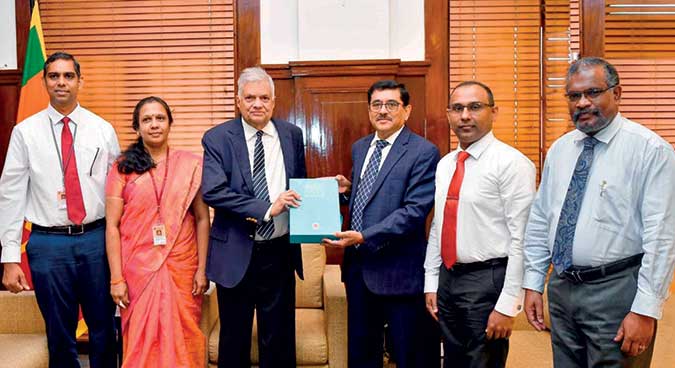Business
‘Country has managed to transition to a workable equilibrium in near term’

CBSL releases Annual Report for 2022
In terms of Section 35 of the Monetary Law Act No. 58 of 1949, the seventy third Annual Report of the Monetary Board of the Central Bank of Sri Lanka was presented yesterday to Ranil Wickremesinghe, the President and Minister of Finance, Economic Stabilization and National Policies, by Dr. P Nandalal Weerasinghe, the Governor of the Central Bank of Sri Lanka.
The Sri Lankan economy faced its most onerous year in its post-independence history in 2022, comprising severe economic hardship that led to both public anxiety and political upheaval.
The impoverished conditions in the economy warranted immediate and coordinated policy initiatives by the Government and the Central Bank to preempt a further escalation of the situation. Although the corrective measures affected the vast citizenry in the near term, they were necessary to safeguard the economy and economic agents from potentially devastating consequences of unrestrained economic instability, such as hyperinflation, collapse of economic activity to a much deeper level, and a complete disconnect of the country from the rest of the world, with far worse consequences to the people and businesses. The outcomes of these efforts have eventuated since late 2022.
The country managed to transition to a workable equilibrium in the near term, focused on restoring socio-economic stability, while the envisaged assistance from the international financial institutions begins to materialise.
Having run an unsustainable macroeconomic model in tandem with the longstanding deficits in the budget balance and the external current account, the economy had fully exhausted its buffers by early 2022 as it was straddled by a myriad of vulnerabilities that emanated from both global and domestic sources. Several inherent weaknesses of the economy, further exacerbated by policy lapses, steered the country towards a multifaceted disaster. Ill-timed tax reductions, an ill-equipped attempt to swiftly adopt organic agriculture, the depletion of the country’s official reserves amidst futile attempts to maintain an untarnished debt servicing record, the delay in the exchange rate adjustment, and the failure to pay heed to several early warning signals caused tremendous shockwaves across the economy.
Consequently, the economy was battered by excessive balance of payments (BOP) pressures with acute shortage of foreign exchange liquidity and pressured exchange rate, spiralling inflation and dampened economic activity amidst mass loss of livelihoods, large fiscal imbalances, public debt reaching unsustainable levels with extraordinarily high risk premia, devastating sovereign rating downgrades that constrained access to external finance, unprecedented heightening of socioeconomic and socio-political tensions, and rapidly deteriorating business confidence, among others.
Businesses and the general public alike were in severe distress amidst shortages and rationing of essentials, the ballooning cost of living and cost of production, and the loss of welfare and livelihoods. Consequently, the rapid unfolding of social unrest resulted in political instability, warranting an urgent need for redefining policy priorities to steer the economy away from further turmoil.
(CBSL)